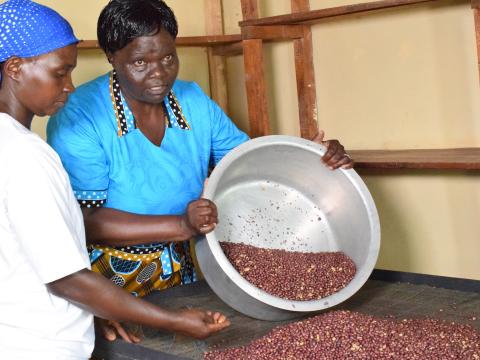Groundnuts Offer an Alternative Source of Income for Sugarcane Farmers in Western Kenya

By Hellen Owuor, World Vision Communications Specialist, Kenya
Sugarcane farming was once the main cash crop for residents of Kenya’s Kakamega County. But scarce markets for the product - caused by the collapse of major sugar-processing industries - have resulted in losses for many farmers.
To address this challenge, in Kenya, World Vision in collaboration with the Ministry of Agriculture has been training farmers on groundnut farming to enable them to have alternative sources of revenue.
“Aside from sugarcane, groundnuts do well here. So, we’re encouraging farmers to take it up so they can get additional income to complement the little that comes from sugarcane,” said Joshua Muloi, the Livelihoods and Resilience Project Lead for World Vision in Kakamega County (Matete Area Programme), Kenya.

The initiative targets the most vulnerable or needy households, as well as other farmers willing to learn about effective ways of growing, managing, harvesting and storing groundnuts to boost production.
Beatrice Marani, a farmer in Matete, states that after being trained by World Vision, she has fully embraced groundnut farming and will not look back.
“Sugarcane takes long to mature. You will plant and wait for over a year before harvesting. With groundnuts, the crops are usually ready for the market in about two to three months. So you can make money many times during the year,” says Beatrice.
In addition, groundnut farming has also enhanced the nutrition status of children, women and families in Matete.
“Our children used to suffer from Kwashiorkor as we mostly gave them carbohydrates or starchy food since we couldn’t afford meat and other types of protein. Now, we grow groundnuts which they can eat frequently,” notes Beatrice.
Groundnuts are also good for women. They contain folic acid, which can help prevent birth defects in the unborn baby’s brain and spinal cord.

A Community Based Organisation, established by the Balibayo Women Group, runs a groundnuts processing industry that offers a ready market for groundnuts in Matete.
“We worked hard to link farmers to existing local markets. The Balibayo group used to buy groundnuts from other areas. But, we approached the management and they accepted to buy from our farmers as we assured them of quality,” Joshua stated.
Instead of making individual sales, groundnut farmers in Matete were advised to form groups and aggregate their produce to help them be able to sell at competitive prices.
“When you are alone, it may be difficult to negotiate and get a good deal. But, when you come as a group, you have a much stronger voice,” says Joshua.
Aside from buying groundnuts from farmers in Matete, the Balibayo Women Group has also been empowered by World Vision and the Ministry of Agriculture on value addition. This enables them to produce a variety of products from groundnuts.
“After getting the knowledge, we bought a roaster and miller that we use for making peanut butter and oil. These products have given us a good profit. We really appreciate that training that we received,” says Beatrice, who is also part of the Balibayo Women Group.